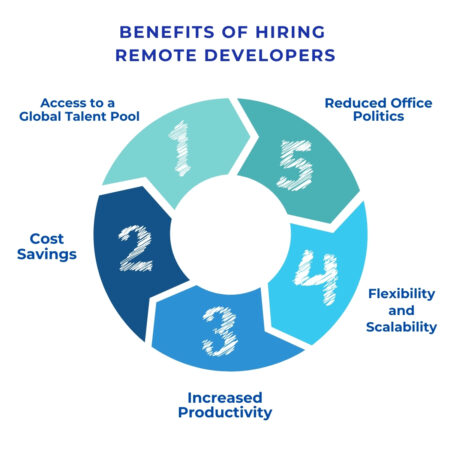
How To Hire Remote Developers: A Step-By-Step Guide
Pranay Agrawal | May 21, 2024 , 12 min read
Table Of Content
The world of work is evolving, and remote development is at the forefront of this change. Companies are increasingly recognizing the benefits of hiring skilled developers who can work effectively from anywhere in the world. This opens up a global talent pool and fosters a more flexible work environment.
However, finding and hiring the perfect remote developer can seem daunting. This comprehensive guide will be your roadmap to success. We’ll walk you through every step of the process, from defining your needs to onboarding your new remote hire. With this guide in hand, you’ll be well-equipped to attract and secure top-tier remote developers for your team.
Key Takeaways
- Hiring remote developers provides access to a global talent pool, offering skilled professionals without geographical limitations.
- The process of hiring remote developers involves defining project needs, identifying skills, using hiring platforms, screening candidates, conducting interviews, and setting clear expectations.
- Remote developers enhance productivity by working in flexible environments, reduce overhead costs associated with office space, and minimize workplace distractions and office politics.
- The cost of hiring remote developers varies based on location, experience, and contract type, with rates ranging between $15–$150 per hour.
- Additional costs include recruitment, onboarding, management tools, and employee benefits, which should be factored into budgeting for long-term remote developer hiring.
- Businesses can leverage freelancers, full-time remote employees, or outsourcing agencies based on their project needs.
How To Hire Remote Developers in 12 Easy Steps?
Here are 12 easy steps to guide you through the process of hiring remote developers.
Step 1: Define Your Project Requirements
Before you start looking for remote developers, it’s crucial to have a clear understanding of your project requirements. Outline the project scope, key deliverables, technology stack, timeline, and budget. This clarity will help you find developers who are a good fit for your project.
Step 2: Identify the Skills Needed
Identify the specific skills and expertise needed for your project. Whether it’s proficiency in a particular programming language, experience with a certain framework, or familiarity with specific tools, make a list of must-have and nice-to-have skills.
Step 3: Choose the Right Platforms
There are various platforms where you can find and hire dedicated remote developers. Websites like Upwork, Toptal, GitHub, and LinkedIn are excellent places to start. Research and select the platforms that best match your hiring needs and budget.
Also Read: How to find App Developers?
Step 4: Create a Compelling Job Description
A detailed and engaging job description is essential to attract top talent. Include information about your company, the project, required skills, responsibilities, and any other relevant details. Be transparent about your expectations and what you offer in return.
Step 5: Screen Candidates Thoroughly
Screen potential candidates carefully. Review their portfolios, check their references, and assess their technical skills. Consider using coding tests or technical assessments to evaluate their capabilities objectively.
Step 6: Conduct Structured Interviews
Conduct interviews to get a better understanding of the candidates’ skills, experience, and cultural fit. Prepare a set of standard questions to ask each candidate, focusing on their problem-solving abilities, communication skills, and remote work experience.
Step 7: Evaluate Communication Skills
Effective communication is critical for remote work. Ensure that the candidates can communicate clearly and effectively, both in writing and verbally. This will help in avoiding misunderstandings and ensuring smooth collaboration.
Step 8: Offer Competitive Compensation
To attract and retain top talent, offer competitive compensation packages. Research industry standards and be prepared to negotiate salaries, benefits, and other perks that align with the candidate’s expectations and your budget.
Step 9: Set Clear Expectations
Once you hire a remote developer, set clear expectations from the outset. Define work hours, communication channels, project milestones, and performance metrics. Establishing these guidelines will help ensure a productive working relationship.
Step 10: Foster a Collaborative Environment
Even though your team is remote, it’s important to foster a collaborative and inclusive environment. Use tools like Slack, Zoom, and Trello to facilitate communication and project management. Encourage regular check-ins and team meetings to keep everyone aligned.
Step 11: Provide Continuous Support and Feedback
Support your remote developers by providing them with the resources they need to succeed. Offer continuous feedback and recognize their achievements. This will help in maintaining their motivation and engagement.
Step 12: Monitor Progress and Adapt
Regularly monitor the progress of your project and the performance of your remote developers. Be open to feedback and ready to make adjustments as needed. This flexibility will help you address any issues promptly and keep the project on track.
Benefits Of Hiring Remote Developers

There are many advantages to building a development team that isn’t confined to the walls of a traditional office. Here are some of the key benefits of having a dedicated yet remote development team:
1. Access to a Global Talent Pool
One of the most significant advantages of hiring remote developers is the ability to access a global talent pool. You’re not limited by geographical boundaries, allowing you to find the best talent regardless of location. This increases the chances of finding developers with the exact skills and experience you need.
2. Cost Savings
Hiring remote developers can lead to substantial cost savings. You can reduce or eliminate expenses related to office space, utilities, and other overhead costs. Additionally, depending on the region, labor costs might be lower, allowing you to get high-quality work at a more affordable rate.
3. Increased Productivity
Remote developers often have the flexibility to work during their most productive hours. Without the distractions of a traditional office environment, many remote workers can focus better and deliver high-quality work more efficiently. Studies have shown that remote workers can be more productive than their in-office counterparts.
4. Flexibility and Scalability
Hiring a team of remote developers offers greater flexibility and scalability. You can quickly scale your team up or down based on project needs without the logistical challenges of bringing on in-house staff. This is particularly useful for startups and businesses with fluctuating workloads.
Also Read: How to Hire Developers for Your Startup?
5. Reduced Office Politics
Remote work can minimize office politics and distractions, leading to a more harmonious and productive work environment. With fewer chances for interpersonal conflicts and distractions, remote developers can focus better on their tasks.
How Much Does It Cost To Hire Remote Developers?
The cost of hiring remote developers can vary widely based on several factors including their location, experience, skill set, and the complexity of the project.
Here’s a detailed breakdown of what you can expect:
Factors Influencing the Cost
1. Geographical Location
- North America and Western Europe: Developers in these regions tend to have higher rates due to the higher cost of living and demand. Expect to pay anywhere from $50 to $150 per hour.
- Eastern Europe: Countries like Ukraine, Poland, and Romania offer highly skilled developers at more competitive rates, typically ranging from $30 to $60 per hour.
- Asia: India, the Philippines, and other Asian countries are known for offering even more affordable rates, often between $15 to $50 per hour.
- Latin America: Countries such as Brazil, Argentina, and Mexico also provide competitive rates, typically ranging from $25 to $60 per hour.
2. Experience and Expertise
- Junior Developers: With 0-2 years of experience, junior developers usually charge on the lower end of the spectrum. Rates can be as low as $15 per hour in some regions.
- Mid-Level Developers: With 2-5 years of experience, mid-level developers tend to charge moderate rates, generally between $30 to $75 per hour.
- Senior Developers: With over 5 years of experience and specialized expertise, senior developers can command higher rates, often between $75 to $150 per hour or more, depending on their location and the technologies they specialize in.
3. Type of Contract
- Freelancers: Hiring freelancers can be cost-effective for short-term projects or tasks. Rates can vary widely but tend to be on a per-hour or per-project basis.
- Full-Time Remote Employees: Hiring full-time remote developers involves a monthly salary. This can range from $2,000 to $10,000+ per month depending on the factors mentioned above.
- Outsourcing Agencies: These agencies provide developers at a markup, but they also handle administrative tasks and provide additional resources. Costs can be higher due to the agency fees.
Additional Costs to Consider
- Recruitment and Hiring Costs: Advertising job postings, recruitment agency fees, and the time spent on interviewing and evaluating candidates can add to the initial cost of hiring
- Onboarding and Training: Investing time and resources in onboarding and training new remote developers ensures they are well-integrated into your team and understand your project’s requirements.
- Tools and Software: Providing necessary tools, software licenses, and collaboration platforms for remote developers can add to the overall cost.
- Management and Coordination: Effective management of remote teams often requires dedicated project managers or team leads, which can increase the overall cost.
- Benefits and Perks: Offering benefits such as health insurance, paid time off, and other perks can help attract and retain top talent but will also add to the total expense.
Example Cost Breakdown
For illustration, let’s assume you’re hiring a mid-level remote developer from Eastern Europe:
- Hourly Rate: $40 per hour
- Full-Time Monthly Salary: $40/hour 160 hours (approx.) = $6,400 per month
For a senior developer in North America:
- Hourly Rate: $100 per hour
Full-Time Monthly Salary: $100/hour 160 hours (approx.) = $16,000 per month
Conclusion
In summary, hiring remote developers offers numerous benefits, including access to a global talent pool. When selecting a partner to build your remote development team, ScaleupAlly stands out due to its extensive talent pool, expertise, flexible engagement models, and commitment to quality.
Building a strong remote development team with ScaleupAlly ensures that you have access to top-tier talent, advanced collaboration tools, and comprehensive project management. These advantages allow you to focus on achieving your business goals while ScaleupAlly handles the complexities of remote team management.
If you’re looking to build a team of remote developers, contact ScaleupAlly today to discuss your project needs and find the perfect developers to drive your success.
Frequently Asked Questions (FAQs)
Q: How long does it take to hire a remote developer?
The time it takes to hire a remote developer can vary depending on several factors, including the complexity of your project, the specific skills required, and the hiring process. On average, it can take anywhere from a few days to a few weeks to identify, screen, and onboard a qualified remote developer. Working with an experienced partner like ScaleupAlly can expedite this process by leveraging their extensive talent pool and streamlined hiring procedures.
Q: Where can I find the best remote developers?
You can find highly skilled remote developers on various platforms, including Upwork, Toptal, LinkedIn, and GitHub. However, partnering with a reputable digital engineering team like ScaleupAlly offers significant advantages. ScaleupAlly has a rigorous screening process, a vast network of qualified developers, and the expertise to match you with the perfect candidates for your specific needs, ensuring a smooth and efficient hiring process.
Q: Should I First Hire Remote MVP Developers Before Investing In Full-Fledged Cooperation?
Hiring remote Minimum Viable Product (MVP) developers can be a smart strategy to validate your project idea before committing to a full-scale development effort. MVP developers can help you build a prototype or a basic version of your product to test its feasibility and gather user feedback. This approach allows you to minimize risk, save costs, and make informed decisions about further investment. Once the MVP proves successful, you can then scale up and invest in full-fledged cooperation with a larger remote development team.
Related Blogs

Nearshoring vs. Offshoring vs. Onshoring: Key Differences
Discover the key differences between nearshoring, offshoring, and onshoring. Learn the benefits, challenges, and how to choose the best outsourcing strategy for your business.
webadmin
Feb 13 ,
6 min read

Top 20 Emerging Technologies of 2026
Discover the top 20 emerging technologies of 2026. Explore which innovations are driving change across healthcare, finance, manufacturing, and other crucial industries.
ScaleupAlly Team
Dec 16 ,
9 min read

IT Outsourcing Costs Explained: Global Rates, Key Influencers & Cost-Saving Tips
Discover what IT outsourcing costs include, key pricing factors, hidden fees, regional rates, and how to pick a cost-effective outsourcing partner.
Pranay Agrawal
Nov 29 ,
13 min read



